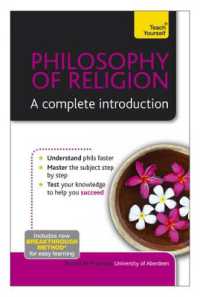- ホーム
- > 洋書
- > 英文書
- > Politics / International Relations
Full Description
Empire of Poverty examines how changing concepts of poverty in the long-sixteenth century helped shape the deep structures of states and empires and the contours of imperial inequalities. While poverty is often understood to have become a political subject with the birth of political economy in the eighteenth century, this book points to the longer history of poverty as a political subject and a more complicated relationship between moral and political economies. It focuses upon the critical transformations taking place in the long-sixteenth century, with the emergence of the world's first global empire and the development of colonial capitalism. The book explores how the 'moral-political economy of poverty' - defined as a new and changing conceptualisation of and approach to poverty, across laws, institutions, and acts of resistance - played a critical role in the development and governance of the Spanish Empire. In so doing it offers insights into the negotiated nature of sovereignty, the construction of inequalities, and strategies of resistance. Empire of Poverty explains how the combined processes of the transition to global capitalism and imperialism in the long-sixteenth century wrought a moral crisis which led to the transformation of poverty and reconceptualization of the poor and how the newly emerging beliefs, laws, and institutions of poverty helped structure the inequalities of the new global order.
Contents
Introduction
1: New World Wealth and Old World Poverty: The Making of an Economic Legend
2: Indigenous Moral Economies & The political Invention of Indigenous poverty
3: The Moral-Political Economy of Poverty and Theories of Global Sovereignty 67
4: Poverty Politics and State Formation
5: Making Indigenous Poverty for a New World
6: The Moral-Political Economy of the Spanish Empire in Practice
Conclusion








